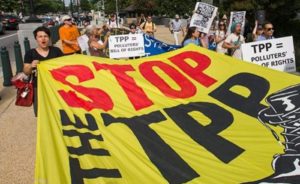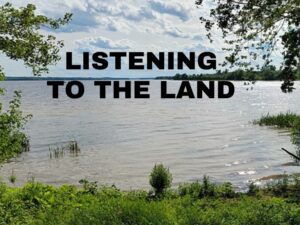Three Amigos’ Climate Change Promises Contradicted by Trade Agreements

The “Three Amigos” summit with the leaders of Canada, Mexico and the United States concluded with a flurry of contradictory announcements. On one hand, Prime Minister Trudeau and Presidents Peña Nieto and Obama pledged to take action on climate change and clean energy. But at the same time they endorsed the North American Free Trade Agreement (NAFTA) and talked about expanding it to include nine more countries through the Trans-Pacific Partnership (TPP). Both NAFTA and the TPP contain serious threats to social and climate justice.
NAFTA is an obstacle to ecological justice because of investor-state dispute settlement (ISDS) provisions that allow foreign investors to sue governments for compensation when they deem laws or regulations unfairly and negatively affect their profits. A study of 196 ISDS claims launched by foreign investors around the world catalogued 34 cases involving conflicts over natural resources and 40 suits that challenge government policies on health or environmental protection.
Canada has faced more ISDS suits than any other developed country. It has lost seven of these suits and paid out $190 million in damages. One recent example is the suit brought by Lone Pine, a U. S. firm challenging Quebec’s moratorium on fracking for natural gas. Similarly, TransCanada Pipelines launched a suit against President Obama’s decision to deny a permit for the Keystone XL tar sands export pipeline.
There are several ways the ISDS provisions in the TPP go beyond what exists in Chapter 11 of NAFTA. The TPP would allow investors from nine other countries not just the U.S. and Mexico to sidestep Canadian courts and launch suits that would be heard by panels of lawyers acting as arbitrators. These would include Australia, Japan and Malaysia.
The TPP also would expand the number of sectors potentially impacted to include government contracts and the regulation of financial services. The TPP provisions defining the rights of foreign investors to “fair and equitable treatment” and protection from “indirect expropriation” are so broadly worded that they allow foreign investors’ “expectations” to be a key factor in determining whether a government has breached its obligations. This means corporations can seek compensation not only for amounts actually invested but also for anticipated profits. There is no ceiling on the amount of monetary awards, and the laws and regulations at all levels of government – federal, provincial, municipal or First Nations – as well as the decisions of Canadian courts could be challenged with few avenues for appeals.
If Canada, for example, implemented a national carbon tax to fight climate change, or passed laws governing Liquefied Natural Gas terminals that a foreign company deemed likely to make its plans to export fossil fuels from Canada less competitive, the TPP would enable that foreign company to launch a suit.
If the TPP is ratified it would do more than simply extend the terms of the NAFTA to nine other countries – Australia, Brunei, Chile, Japan, Malaysia, New Zealand, Peru, Singapore and Vietnam. It will also lead to more greenhouse gas emissions by promoting more international shipping of goods and unrestrained fossil fuel exports.
The TPP, like NAFTA, would prevent governments from insisting that foreign investors meet certain performance requirements such as using local labour or transferring technology while permitting the free repatriation of capital.
The TPP would make it easier for employers to hire temporary migrant workers even when unemployment is high and qualified local workers are available to do the same jobs. What is most concerning is that the agreement does not include guarantees for protecting migrant workers’ rights.
The intellectual property chapter in the TPP would extend the patents on medicines held by brand-name pharmaceutical companies and further reduce access to less expensive generic medicines. Médecins Sans Frontières (Doctors Without Borders) calls it the “most harmful trade pact ever for access to medicines in developing countries.”
The TPP’s protections for foreign investors would make it more difficult for Canadian governments to establish new public health programs such as pharmacare which provide low-income Canadians access to medicines.
Canadians have many reasons to look carefully at the policies promoted by the prime minister and the two presidents. If these leaders are serious about promoting action on climate change and clean energy they would be talking about rolling back the damaging provisions in NAFTA instead of expanding its reach to nine other countries.
John Dillon, KAIROS Ecological Economy Program Coordinator












